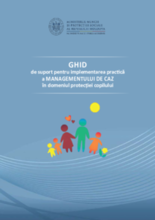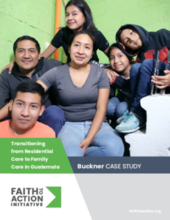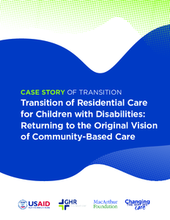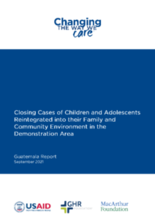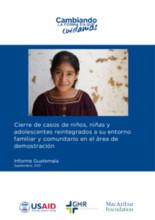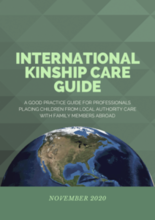The aim of this stage is to conduct child and family assessments, to engage children and their families in participatory decision making, to make analytical decisions or recommendations, including regarding placements, based on what is determined to be in the best interests of the child, and develop care/case plans to prepare children/youth for placement.
As this stage includes the placement decision making step, it may include involvement with courts, gatekeeping panels or other authorities who are mandated, under the child protection laws of many countries, to make the final decision regarding a child’s reunification, placement in family-based care or adoption.
Whereas previous stages were concerned with developing and putting in place the social work and case management framework, this stage is concerned with implementation.
Activities that may occur during this stage include:
- Trust building exercises between social workers and the children/youth
- Consultation with children/youth
- Conducting child assessments
- Conducting family assessments (including for parents or kinship caregivers), including meeting with local authorities, community leaders and neighbors
- Assessing foster carers (suitability of foster caregivers for a specific child and matching)
- Guardianship or adoption assessments
- Conducting community assessments
- Investigating, reporting, responding to incidents or allegations disclosed during assessments and/or counselling
- Considering children’s involvement in legal proceedings in cases where abuse or exploitation is uncovered
- Organizing or providing counselling or therapeutic services for children/youth
- Conducting risk and protective factors analysis of information gathered through assessments
- Conducting case conferencing
- Conducting Best Interests Determinations (BID)
- Preparing assessment reports and recommendations for gatekeeping bodies/panels/courts
- Conducting meetings with gatekeeping bodies/panels (which may include the children)
- Court appearances (where courts determine placement or are required to reinstate parental powers)
- Decision making about children’s placements
- Facilitating family re/connection
- Family conferencing meetings
- Facilitating goal setting and children’s participation in care planning
- Developing care plans to prepare children for reunification or placement in family-based care and developing family support plans to coordinate sufficient support and preparation for families or caregivers.
- Developing case plans to prepare young people for transition/aging out of care and independent living.
- Setting goals that are benchmarks for case closure
- In some cases, children/young people may have been reintegrated without due process of support. It may be necessary to locate these children and young people, conduct post reunification/care leaving assessments and put support plans in place.
Key milestones associated with this stage are:
- Robust assessments for all children and families conducted
- Decisions about each child’s placement made, with participation from children, families and mandated authorities, courts or gatekeeping panels
- Care/case plans developed for each child to support their reintegration
Resources
Displaying 1 - 7 of 7
Ghidul de suport pentru implementarea practică a Managementului de caz în domeniul protecției copilului este destinat angajaților structurilor teritoriale de asistență socială.
The story of Buckner Guatemala’s transition from residential care to family care is told in this recently released Faith to Action case study. The case study details their experience through three stages of transition—learning, preparation and planning, and full transition—with transparency. It addresses common challenges for transitioning organizations, as well as the strategies Buckner took to overcome them.
The Returning to Original Vision case story demonstrates reunification of children with disabilities as a critical step in transition. It also highlights the challenges of maintaining organizational vision within a process of transforming services.
The report is aimed at professionals in social work, psychology and pedagogy who work directly with children who are in the process of reintegration into a family and community environment. The document contemplates the process carried out for the closure of cases approached from a case management methodology. The report captures the experience that was had in Zacapa, Guatemala, and it reflects on the importance of reintegration through a planned process of case management and close accompaniment to families and caregivers.
El documento “Cierre de casos de niños, niñas y adolescentes reintegrados a un entorno familiar y comunitario en área de demostración” es un documento dirigido a profesionales de trabajo social, psicología y pedagogía que trabajan directamente en la atención a NNA que están en proceso de reintegración a un entorno familiar y comunitario, el documento contempla el proceso realizado para el cierre de casos abordado desde una metodología de gestión de casos, dentro del documento también se narra la experiencia que se tuvo en Zacapa, Guatemala y se reflexiona sobre la importancia de la reintegración a través de un proceso planificado de gestión de casos y de acompañamiento cercano a las familias y cuidadores.
This guide is the first of its kind which comprehensively addresses the best practice for placing Looked After Children currently in the UK into the care of a family member(s) who lives in another country.
The purpose of the Home Thrive Scale™ is to assess the possibility of a child staying with or returning to their family and to identify services needed to make reintegration possible.

